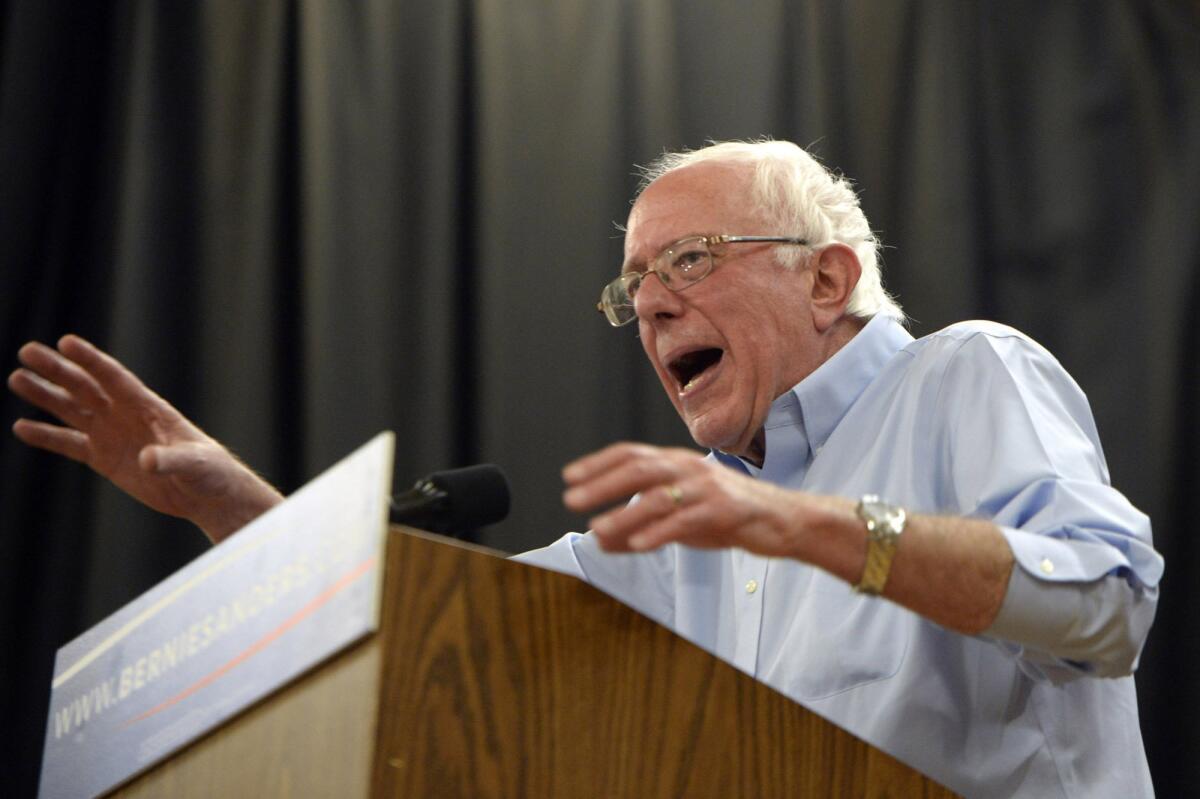Newsletter: Opinion: What kind of ‘socialist’ is Bernie Sanders?

Democratic presidential candidate Sen. Bernie Sanders speaks at a town hall meeting in Iowa on Oct. 18.
Good morning. I'm Paul Thornton, The Times' letters editor, and it is Saturday, Oct. 24. Thanks to you (our readers) and my colleague Matthew Fleischer for keeping this newsletter active during my four-week family leave. Here's a look back at the week in Opinion.
Columnist Doyle McManus checked in on the two most trending names in the 2016 race, and neither of them belonged to a candidate in the Republicans' presidential circus. McManus advised Democratic candidate Bernie Sanders, familiar to most Americans as a self-described "socialist," to do less explaining of his political philosophy and more talking specifically about how his big-government ideas would work.
Given Sanders' rousing statements on debt-free college, single-payer healthcare and income inequality, he probably sits somewhere to the left of mainstream liberalism on our very un-communist, capitalism-friendly political spectrum. But those broad policy positions aren't enough, McManus writes:
Sanders is running for the presidential nomination of the Democratic Party, not the Socialist Party. He's watered down the faith of his youth to make it more palatable to most Americans — and that's fine.
He's turned into a "social democrat" much like the technocrats he praises in Denmark and Sweden. To purists on the left, that makes Sanders a SINO — a socialist in name only. But he's winning millions of converts and widening the Democrats' window of debate toward the left, which is more than old-school socialists have accomplished since about 1972.
But giving explanatory speeches will only take Sanders so far. What he needs to do now is describe how his ambitious, big-government proposals would work, whether you choose to call them progressive, socialist or anything else. He hasn't done much of that, even though he's been running for six months.
Take his biggest, boldest idea: Medicare for all. Sanders says he wants everyone enrolled in one big government-run health insurance system. No more private insurance plans, no more Obamacare, no more Medicaid. At least, that's what I think he means; he hasn't provided any details.
"I wish I had more answers for you," his policy director, Warren Gunnels, told me this week. "He hasn't decided on the exact form it should take — other than being universal, single-payer, Medicare for all."
McManus also checked in on Hillary Rodham Clinton's campaign in light of this week's Benghazi hearing in the House. Which side ends up winning (the Republicans on the Benghazi committee or Clinton), McManus says, depends on which side can keep itself from looking worse. He writes about Clinton: "She won't be out of the woods after this week's hearing; the FBI, in particular, could still give her headaches. But in this week's showdown, my money will be on Clinton." L.A. Times
What could the money you pay for housing in L.A. buy in, say, the French Riviera? There’s a map for that. NeighborhoodX co-founder Constantine Valhouli gathered a bunch of real-estate data (which he says until now have been "incredibly opaque") and finds some interesting price equivalencies between familiar Los Angeles neighborhoods and desirable locales around the world. One fascinating tidbit: "Buying a home in Crenshaw ($363 per square foot) is just as expensive as buying a place in Barrio Brasil ($360 per square foot), one of the most desirable neighborhoods of Santiago, Chile." Here's his piece, and below is his map:
The best jokes about millennials ruining society are meta, but some writers haven't moved on from searing criticism. Writing about Times scribe Chris Erskine's attack on the young-ish generation, Opinion contributing editor Ann Friedman (herself born in 1982) says she thought we had already hit peak millennial-trashing. She traces the arc of generation-bashing (including that of the Baby Boomers and Gen-Xers) and notes that millennials themselves have started turning their curious gaze (which will surely become contempt) toward those privacy-embracing, technology-skeptical troglodytes known as Generation Z. L.A. Times
With Democrats in nearly total control of Sacramento, big money has started migrating to a powerful group of moderate Democrats. CALmatters columnist Laurel Rosenhall takes a fascinating look at the centrist Democrats who blocked parts of Gov. Jerry Brown's climate-change initiative while benefiting from contributions from firms like PG&E, Wal-Mart and Chevron. CALmatters
You thought no one could rain on "Back to the Future Day." I did: "We may not have hoverboards, flying cars and pint-sized fusion reactors in 2015, but we have achieved something the ‘Back to the Future’ prognosticators couldn't foresee but unintentionally showcased: neighborhoods that are hopelessly off-limits to almost everyone." Sorry to ruin it for you. L.A. Times
I hope reading the rest of this newsletter wasn't too much of a buzz kill. Let me know if it was by e-mailing paul.thornton@latimes.com with your feedback.
A cure for the common opinion
Get thought-provoking perspectives with our weekly newsletter.
You may occasionally receive promotional content from the Los Angeles Times.



